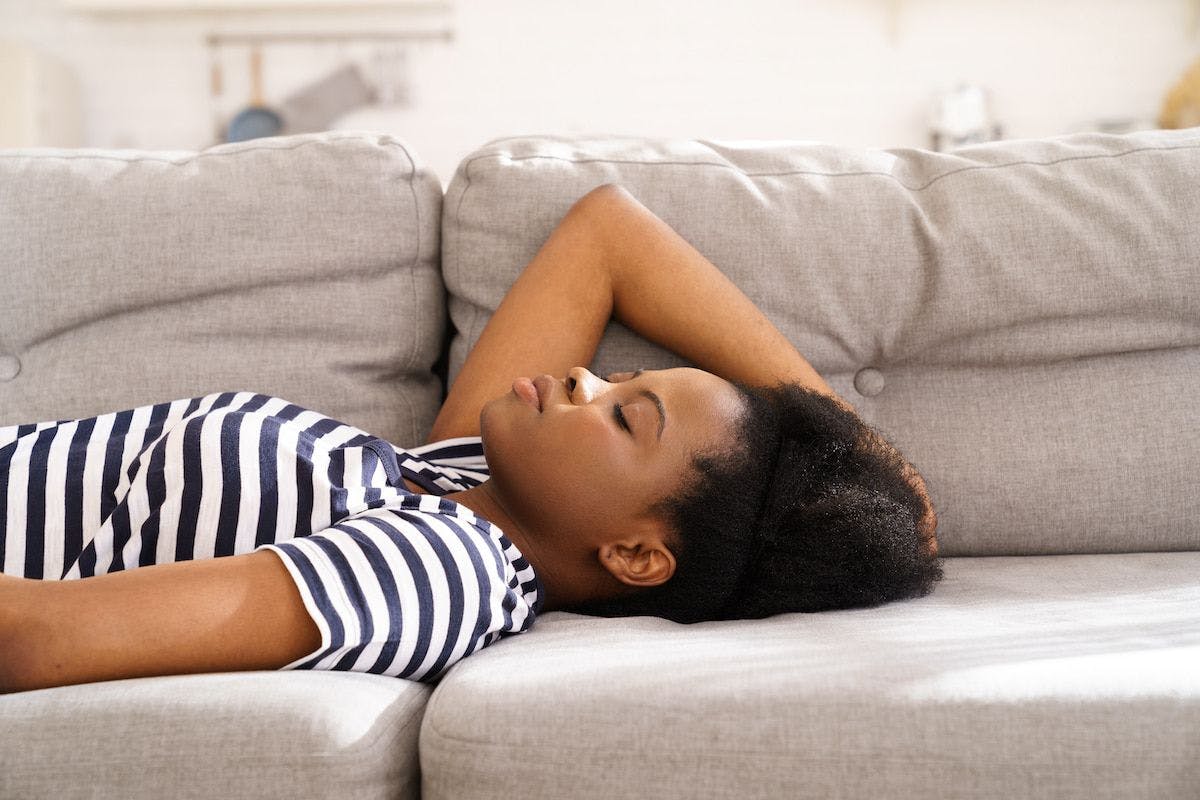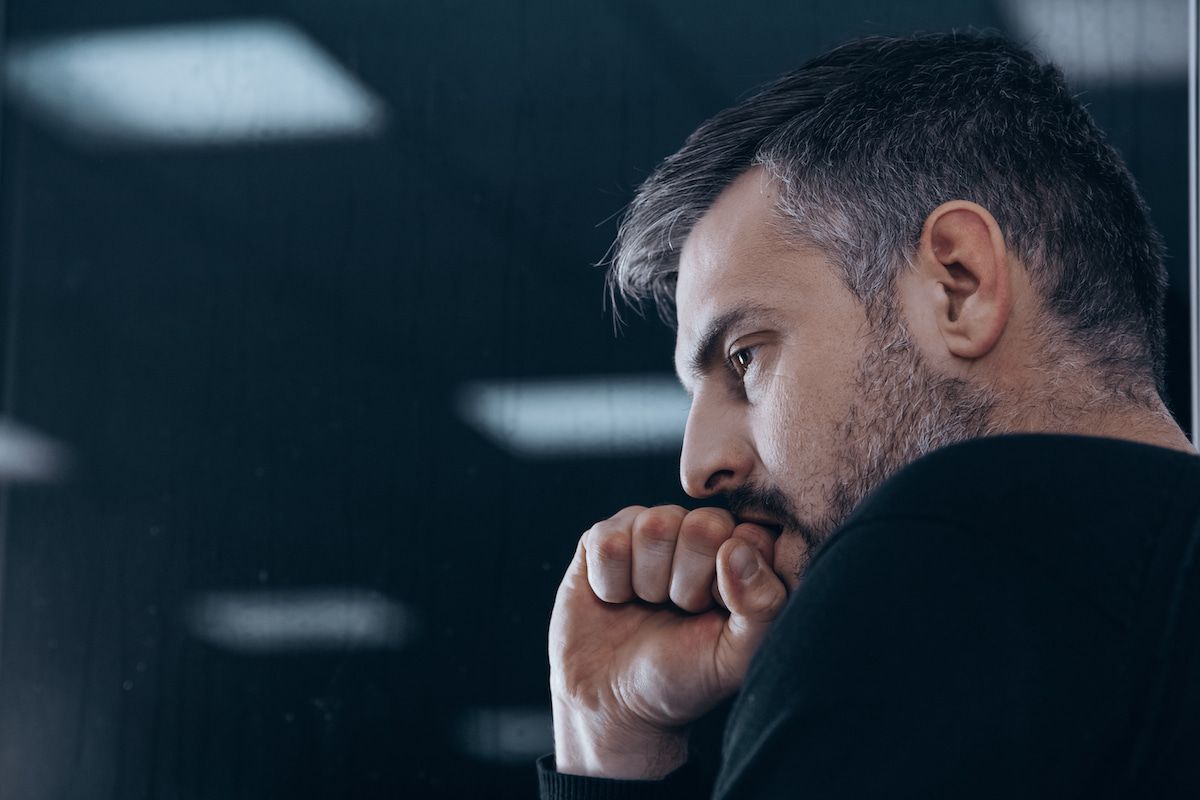
When a panic attack subsides, the lingering after-effects leave your mind and body feeling drained. Here are some expert tips to deal with this emotional ‘hangover from hell’
It’s the day after a big panic attack, and my head feels like lead. I’m on the comedown, still trying to re-attach myself to reality and find a fraction of normality in my uncomfortably dissociative state. I don’t feel like ‘me’ yet. I’m tired, achy, and drained. My body has been left tense and shaky, exhausted from the intense mental battle my mind has just taken me through. My muscles ache, my heart pounds, and my jaw is clenched, even though the panic is long gone.
For those who don’t experience anxiety or panic attacks, this uniquely draining feeling can be compared to that of a brutal hangover; the morning after a night of drinking. With a mouth of cotton wool, shaky hands, and a churning stomach, you experience many of the same emotions and physical sensations – guilt, shame, exhaustion, and nausea to name a few. You have messages from friends and family checking in on your wellbeing, your house is a mess, and everything feels like effort. The high is over, but you just don’t feel grounded yet.
But that form of ‘hang-xiety’ is common and understandable. There’s a logical process behind it, and you can pinpoint the exact reason why you feel the way you do. Perhaps it was due to those green-coloured cocktails, or the unexpected fourth glass of wine? Maybe it was that final sip of Prosecco that pushed you over the edge? You know you’ll recover, of course, and can spend the next week laughing in half-embarrassed shame about your disastrous antics while planning the next exciting night out.
When it comes to panic attacks, however, recovery can be a much slower and more difficult process.
I’ve been experiencing panic attacks and anxiety from the age of 11, and I know firsthand just how easily they can be triggered. From long car rides to irrational health scares, anxiety can hit me when I’m least expecting it, and can drastically de-rail my day. I can endure multiple crippling panic attacks, embarrassing intrusive thoughts, shaking, nausea, and hyperventilating all before noon on some of my lowest days.
My anxiety can be brutal and unrelenting, and there have been many days when I feared I’d simply lose myself in the panic. Eventually, after many hours, my panic will, without a doubt, end. The fear fades, my shaking hands will settle, and I can finally tell myself that the worst is over.
But the next day, I’ll feel like an empty shell; a zombie with no energy and no motivation to do anything except sleep and rest.
The thought of leaving the house can make me feel nauseous, my limbs are as heavy as lead, and I am tired.
Why are we so exhausted after an anxiety attack?
Psychotherapist Carol-Anne Cowie describes the post-anxiety fatigue as the natural process of the body following the hyperactivity of a stress response to a perceived danger.
When the ‘fight-or-flight’ response is triggered by the sympathetic nervous system, the body releases hormones such as adrenaline; as well as diverting blood from ‘non-essential’ functions, releasing adrenaline mobilises glucose and energy, inevitably leading to exhaustion and feeling drained.
When we experience panic attacks and anxiety, our brains and our bodies can experience a huge chemical and hormonal shift, taking us out of our typical physiological routines, and introducing new chemicals such as adrenaline and cortisol (the stress hormone) instead. These hormones are fast-acting and intense, providing the physical symptoms of anxiety in rapid succession as our minds react to the imagined threat we’re facing.
But once the anxiety has passed, our bodies can crash without the high of the stress hormones keeping us active. We feel unable to calm down completely after such a rapid spike, but unable to perk ourselves up either. Our bodies need time to re-regulate, to allow our nervous systems to fall back into their standard patterns, and to help our minds understand that we are safe.
The physical sensations that can follow an anxiety attack are numerous. Carol-Anne explains: “This uncomfortable period may vary from around 10 minutes, to up to a week or longer, and can produce a variety of feelings such as exhaustion, frustration, confusion, depression, and emotional fragility.”
You might find that you still experience small waves of anxiety in the days following an attack, or that you feel a little detached from reality as your mind struggles to ground itself. You might find it hard to focus, experience a change in appetite, suffer tense and stiff muscles, and disturbed sleep – all of which are the result of the sudden high and fall of your stress levels.

Common symptoms of post-anxiety anxiety:
- Fatigue
- Restlessness
- Sudden waves of anxiety
- Shaking/trembling
- Change in appetite
- Disturbed sleep
- Mental fog/confusion
- Dissociation
- Muscle tension
How to care for yourself in the aftermath of anxiety
The process of healing from an anxiety attack can be divided into two stages.
Physically, we need to be able to reconnect with our bodies and allow them to relax again after such a distressing time. We need to treat them with kindness, carving out time for self-care, gentle exercise, and healthy eating. Try a soothing, warm bath and a gentle massage in periods of mindful downtime. Even putting on a simple face mask, and pampering your skin, can go a long way towards improving how you feel within yourself.
But we also need to care for ourselves mentally. We should use this time to sink into meditative activities, and create safe, calming spaces for our anxious minds to relax in.
Our minds can take such a beating during a panic attack, and we should all give ourselves the time to reflect and heal from our own psychological distress.
It’s also likely that some leftover anxiety may create uncomfortable intrusive thoughts as you begin to heal, and you might start to worry that another panic or anxiety attack is coming. Your mind can fill with fears such as: “What if I panic again when I’m at work?”, “There must be something seriously wrong with me,” and “I won’t be able to cope with another panic attack.”
But, it’s important to understand that these are just thoughts formed from your worst fears. They are not facts, they are not predictions, and they do not define how you truly feel. You are already recovering, and these feelings will pass. You will be OK.
How to help your body feel better after an anxiety attack
Carol-Anne Cowie recommends the following to help alleviate some of the symptoms following an anxiety attack:
- Balance your body temperature, get fresh air if you are overheated, or stay warm as hyperventilation during panic attacks resulting in reduced blood flow can cause shivering.
- Focus on breathing exercises such as ‘four-count breathing’ (inhale to the count of four, hold for four, exhale for four, hold for four, repeat) will help you to regain a sense of control and your body to enter a state of calm.
- Go for a walk, work off the adrenaline, and channel the energy so that it leaves the body, helping you to recover faster.
- Dancing or shaking your whole body helps to regulate the nervous system after the fight-or-flight response.
- Have a warm bath with some magnesium and lavender to relax tense muscles.
- Make a hot or cold drink. The familiarity of the routine of making the drink, and the comfort of tasting something you enjoy, can help to anchor your thoughts.
At this moment, you need to be your first priority, and it’s important to understand the messages your body is sending you. Whether you feel you need to rest, to exercise, to relieve some tension, or just to get back into a routine, pay attention to the form of self-care that your body is craving.
Carol-Anne Cowie is a highly-experienced psychotherapist. For professional support and more information, visit counselling-directory.org.uk.

